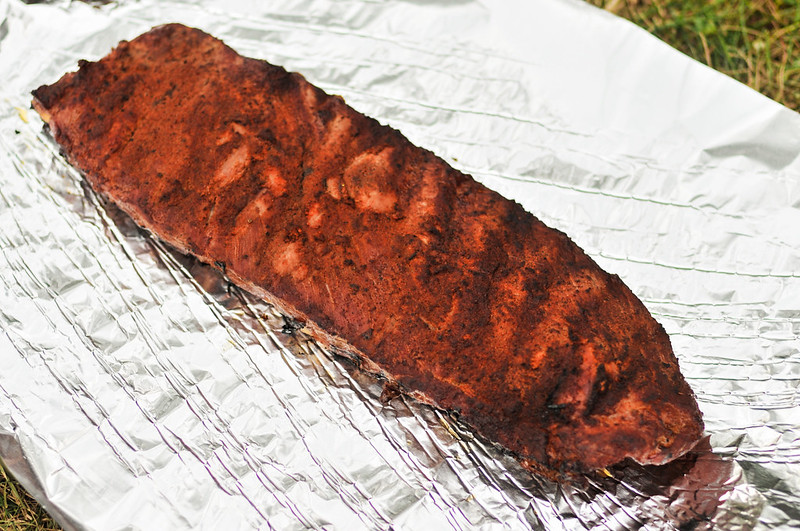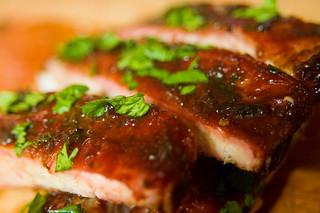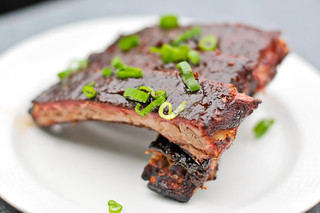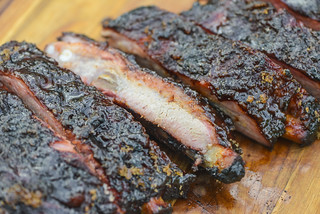Competition-style Barbecue Ribs
Earlier this month, at the Battle of the BBQ Brethren, I rocked the pork, brisket, and chicken categories compared to my performance last year which found me in the lower rungs of each. My one shinning light through those past "failures" were ribs, which consistently came in near the top, and even awarded me a fourth place out of fifty at the Hudson Valley Ribfest. So I thought I had them in the bag for this summer, but low and behold, ribs turned out to be my weak spot in my last competition. Needing to take a look back at the process I developed and tested with success, I'm busting out the step-by-step procedure I previously documented. In sharing it I'm hoping it will serve both as a reminder to myself when planning for my next competition, and to you as a way to make some really incredible ribs this Labor Day weekend.
Ask most pitmasters if they really like their competition ribs and they'll flatly say no. That's because in preparing a rib that will likely only see one bite, it needs to be overloaded with a sweet and bold flavor to make it stand out from the crowd. Even so, there are great lessons to be learned in flavor creation and cooking that directly translate to how I've altered my backyard recipe to make the ribs I do serve my friends and family better than they ever were.
It all starts with a rack of St. Louis cut spare ribs and a slathering of mustard. This layer of mustard prior to coating them with a dry rub not only adds a bit of a mellow bite to the finished product, it also allows for more rub to adhere, and more rub equals more flavor.
The rubs I use in competition are heavily composed of sugar with a mixture of salts—kosher, seasoned, and celery—and a smoky spice to get all the sweet and heat I'm looking for. At home I tend to use a rubs that are less heavy on sugar and have nuanced layers of spice. The recipe for Magic Dust from 17th Street Bar & Grill is a fine example of this and I highly recommend giving it a go.
Rubs basically all come down personal preference, but the important part of my ribs success is the way I altered the cooking process. Prior to competition, I always just threw some racks on the pit and let them slow smoke until tender. This produced fine ribs, but also inconsistency in texture and moisture. To fix that, I've adopted the approach often referred to as 3-2-1.
This starts with smoking the ribs for three hours to embed them with a smoky flavor and set the rub. Once the top surface of the ribs has turned a nice mahogany color, each rack is then wrapped in foil along with a bit of liquid seasoning—usually apple juice—and put back on the smoker.
The two refers to cooking them for two hours longer while wrapped, but I found this to be too long and resulted in ribs whose meat was overly tender and pulled away from the bone too much. So instead I cook them foiled for 45 to 60 minutes, just until the meat starts to pull back from the bone a little bit.
They're then unwrapped and put back into the smoked to cook until done—usually another one to two hours. The racks are finished when they have a slight bend when lifted from end.
At this point the ribs are "done," yet they have yet to be sauced. To avoid over cooking, I've taken to slathering them and setting the sauce on the grill with both a little direct and indirect heat. Over a hot fire, getting the sauce to thicken only takes 5 to 10 minutes, compared to another thirty or so it would take with the low heat of the smoker.
The final step to my competition recipe is something I would never think of doing at home. To get that super glossy sheen and sugary touch the judges seem to love, I rest the ribs in spread of dark brown sugar and agave. You can see this makes them mighty pretty, but it also drowns at lot of the great layers of of spice and heat in bath of sweetness that I just don't understand. I made my competition rub and sauce extra bold so it can stand up to this final bastardization, but if making them for a crowd, I'd advise skipping this step unless you're a big fan of sugar on a stick.
The end result of the entire cooking process are ribs that are incredibly moist, perfectly tender, and smoky masterpieces. This method may take a bit more time commitment than just throwing some slabs in the smoker, but I've found the extra effort produces a consistent rib that is exemplary in texture. My fault in my last competition was not paying close enough attention to each of these steps to success, taking a complacent stance to the ribs as I let my focus drift too much to the other categories.
Luckily, Labor Day affords us all with some extra grilling and smoking time. That means you can pay a bit more attention to your ribs, and following this method will hopefully ensure you'll be pitmaster hero of the holiday.
Happy Grilling Meatwavers!
You Might Also Like
Comments
-
Kevin H. Do you always compete with St. Louis style? I'm from St. Louis and have competed with them twice - both with terrible results. When I compete with baby rack I fair much better. My problem is baby backs don't look nearly as nice in the box. I'm torn. Yours look gorgeous and I follow a very similar process...I just can't seem to compete well with the STL style!
Anyway, thanks for recipes and process - at least I know I'm on the right track! -
Chris Nice appearance, I'd give it an 8 or 9.
I have about the same foil timing as you.
As home, I go back and forth between SL spares and baby back. But as far as judging, I find I prefer getting spares over baby backs. They seem consistently better to me. This past weekend my table had 5 spares and only 1 baby back submission. The baby back was the table's least favorite. -
joel can you email me this recipe pls thank you
-
Steve @ schmoky.com Perhaps it is just my own opinion, but i prefer more fat on the meat itself. Your ribs look delicious, but i feel they are too thin and smoking (which is a long-term process) can dry them out.
-
Bert instead of putting the ribs on the grill and saucing them after smoking, can i put the sauce on the ribs the last hour they are in the smoker?? thanks
-
Josh @Bert Yup, that works too.
-
Sally I am happy to see that someone else thinks the super sweet sauces take away from all the flavors of the rubs we work so hard to perfect. We were in our first bbq competition this weekend. Our ribs and pork butt were good, but because we did not sauce our meat, we did not do well. We are struggling with changing it to please the judges, or staying true to ourselves and cooking for friends and family. I feel a bit vindicated. Thank you!
-
Lana P. Hello BBQ addicts!
I haven't been a bbq addict my whole life until now! My family and I moved from the city to the country and here we have a lot of space and BBQ happenings almost every week! Now it's a break here, because winter is coming.
Back in those times I'd lived in the city we had this amazing place nearby called Electric Mud BBQ and as the name shows it was a place full of ribs and other delicacies!
Now is my turn as a head of the family to step up my game and prepare the best ribs in our little "town"! :)
So thank you very much for this easy step-by-step guide and amazing pictures. These trips and tricks are something I've been looking for and I'm looking forward to prepare it for my family :) -
MM I use butter for the second 2 hours in foil.
It seems you are smoking over direct heat. That may be why you change the middle 2 to 60 minutes. I cook offset. My ribs are never over direct heat.
My pit has a separate fire chamber. -
Rick D I like your variation on the 3 2 1 method. I m ok with fall off the bone. But I really prefer a bit more firm to the bite. Your method works great.











